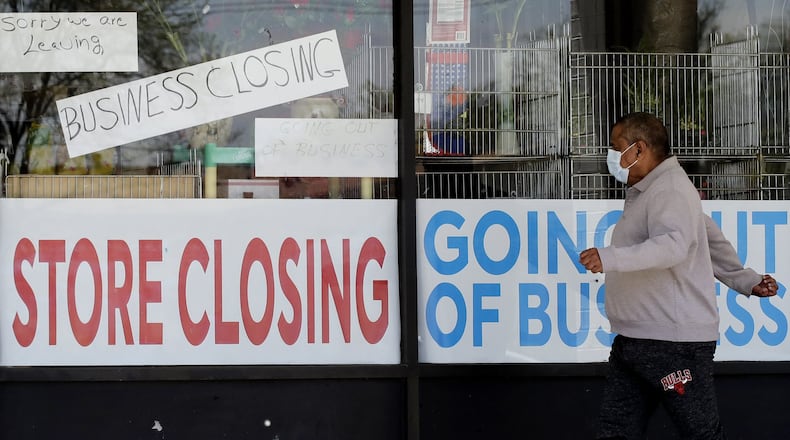Editor’s note: This story has been updated throughout, including the latest weekly jobless claims for Georgia.
Metro Atlanta added 35,200 jobs last month, a robust rebound from the massive losses of April and the second-largest monthly job growth on record, the Georgia Department of Labor reported Thursday.
But it would take nearly nine months at that pace to return the region to the peak employment reached last November, before the historic surge of layoffs triggered by the coronavirus pandemic. And the tidal wave of jobless claims has continued deep into June, with many Georgians waiting for money amid significant delays.
Still, May at least held hope that a turnaround has begun, with the official unemployment rate dropping to 10.3% from 12.7% in April.
"We are definitely heading back in the right direction," said Mark Butler, the state's labor commissioner.
It's just that the economy went a long way in the wrong direction in a short time. Since November, the metro region has hemorrhaged 311,500 jobs.
Most of the damage was done by the deliberate shutdown of several sectors of the economy – mainly hospitality, personal services and recreation, along with closures of many medical offices that were not focused on the coronavirus. The partial recovery mirrors recent May employment reports for Georgia and the U.S. as many idled restaurants, salons, fitness centers and other businesses reopened.
What experts fear is that consumers will still be so wary of the coronavirus that there will not be enough demand for the services that those businesses provide, which would lead to bankruptcies and another wave of layoffs. In a troubling sign, coronavirus cases have been rising again in recent weeks across many parts of the U.S.
The pounding has been worst among lower-wage workers, according to a paper from the University of Chicago-based Becker Friedman Institute: Nearly a third of workers making $13.50-an-hour or less lost their jobs at least temporarily, the researchers found.
In metro Atlanta, low-wage workers have only seen marginal improvement in recent weeks despite the lifting of restrictions on businesses and the end of shelter-in-place orders, according to Steady, which provides finance-management tools to gig and low-income workers.
Hospitality, restaurant and rideshare jobs have not rebounded, leaving about one-third of the income for Steady's members coming from unemployment benefits, said Adam Roseman, chief executive officer. "All in all, we are not seeing a meaningful increase in our members' incomes."
Rideshare incomes are up 7% from the bottom in April, but are still down 63% from pre-pandemic levels, he said.
Kerin Thorpes, 36, of Atlanta, drove for Uber to have more time to spend with his children, including a premature child born in February. As the pandemic intensified, the business evaporated, and he filed for benefits in late March. He was asked for some documentation, which he provided, he said.
He’s still waiting on payments.
Jobless claims have been at historic levels since mid-March. Last week, 125,725 initial job claims were processed in Georgia – slightly more than half of them in metro Atlanta, the Department of Labor said Thursday.
When the claims began pouring in, the department had fewer than 1,000 employees across the state, far fewer than a decade ago. Phone calls and emails have gone unanswered and thousands of jobless Georgians have waited for payments.
Some have waited a long time.
Robert Hutchinson, 29, lost two jobs, one at a fast-food restaurant, one at a large delivery company. The Stone Mountain resident filed for benefits in early April.
“I have done everything on my end,” he said. “I have three kids I am trying to take care of, sir. It would really mean a lot to me if there was (a payment).”
Despite the layoffs, some companies are hiring or rehiring:
— CarMax has called back nearly all 330 employees furloughed in April, according to a spokeswoman. CarMax is also planning to fill up to 400 more jobs by summer’s end, she said.
— Allied Universal is hiring 60-plus people in metro Atlanta, most of them as security staff for businesses, museums, offices and apartment complexes.
— Ironshield Brewing and Big Kettle Brewing are hiring in Lawrenceville, expecting to more than double from the current 10 employees by year's end, according to the Gwinnett Chamber.
Still, May's lower unemployment rate may be making the labor market look better than it really is, said Andrew Stettner, senior fellow at the Century Foundation and an expert on the unemployment system. "The unemployment rate is not a good estimate right now. It does not include people who may be part-time and collecting partial benefits."
Moreover, the official jobless rate only counts people working or looking for work. Metro Atlanta in May had 126,938 fewer people in the labor force than a year ago.
More than 2.7 million jobless claims have been processed in Georgia since mid-March. About 700,000 people are currently receiving payments – more than 14% of the labor force.
Job gains, job losses
Metro Atlanta, share of jobs in Georgia, January: 62.1%
Metro Atlanta, share of jobs lost this year: 68.2%
Source: Bureau of Labor Statistics, St. Louis Federal Reserve, staff research
Georgia, initial claims for jobless benefits
Week ending
March 14: 5,445
March 21: 12,140
March 28: 133,820
April 4: 390,132
April 11: 319,581
April 18: 247,003
April 25: 266,565
May 2: 228,352
May 9: 242,772
May 16: 177,731
May 23: 165,499
May 30: 149,163
June 6: 135,254
June 13: 131,997
June 20: 125,725
Sources: Georgia Department of Labor, U.S. Employment and Training Administration, St. Louis Federal Reserve Bank
Metro Atlanta unemployed, unemployment rate
Dec: 83,468 (2.7%)
Jan: 101,327 (3.2%)
Feb: 104,683 (3.3%)
March: 138,851 (4.4%)
April: 370,964 (12.7%)
May: 301,917 (10.3%)
Sources: Georgia Department of Labor, U.S. Bureau of Labor Statistics
About the Author
Keep Reading
The Latest
Featured




